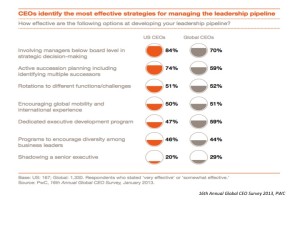Organization’s attempts at leadership development are reflective of the age-old debate on parenting: does it take a lot of time or quality time?
The chart below describes the common actions taken by CEOs to develop the next generation of leadership talent according to Price Waterhouse Coopers.
When it comes to leadership development, it appears organizations focus on planning activities instead of building judgment, values and character. It also demonstrates that leadership development is something senior executive want addressed as a program but they want to spend little or no personal time in this area. (Note the time spent in shadowing a senior executive).
Leadership Lesson: Leadership development is not a microwave process; it requires a crockpot. Leadership development is not a list of activities that are marked off a checklist (i.e., how many functions one has worked in). Rather leadership development is dependent on the ingredients that simmer in the stew. If those ingredients do not come in contact with each other, the unique flavor is never created.
If one looks at leadership trust across all types of organizations, then one realizes that the major battle is one of character, values and philosophy and not primarily skill. We are failing miserably in leadership development because our focus is on checking activities off a list rather than exposure to excellent leaders who are struggling with real problems. Antiseptically dissecting a case study in a classroom is not the same as sitting with a leader who is struggling with the right thing to do in real-time when all the facts are not on the table. Leadership talent development requires large quantities of exposure with the leader because one cannot plan when critical learning issues will arise. Until leaders realize that it is not setting up classes or even rotational assignments that develop leadership talent but rather exposure to applied excellence, leadership development will be hollow. That takes investment of the rarest resource the leader possesses: time. This is how we find out how important leadership talent development really is!
Copyright 9 By 9 Solutions 2016 All Rights Reserved

I suspect that we all have one or more leadership traits but that is not enough to make us leaders. Leadership is a lifestyle that few of us choose and even fewer of us can live. Leaders must:
— Give their word.
— Keep their word.
— Live their words.
— No excuses.
Employers need to know how to identify and hire future successful leaders and then train them, educate them, and give them the experience they need.
Leadership is more often than not an avocation but for most leaders it is a vocation.
The following four paragraphs are from, http://www.newworldofwork.co.uk/2012/07/11/your-real-work-as-a-leader-a-sense-of-vocation/
**************
Avocation can be understood as ‘that which one does’ whilst vocation is something to which one feels called. Vocation sits at an altogether deeper level and when tapped into, provides a source of direction and motivation. For some their vocation is all too apparent whilst for others it is the result of deep exploration and self-awareness. The tragedy is that many go through life preoccupied with a sense of avocation that serves to keep them from their vocation. How often have you heard someone say, “I really wanted to be a teacher (or artist or whatever) but I was compelled to become an accountant”? It speaks of a life lived down a path poorly chosen and is usually filled with regret and sometimes resentment.
Sometimes, of course, it is a whole lot easier to fall into an avocation. It is more convenient, more practical and conforms to the expectations surrounding us. It is altogether understandable and so with a sigh and shrug we get on with the routine, do what is pragmatic and fulfill our responsibilities. Often we are not really aware what our true vocation is and should it only come into focus once an alternative course has been set, it takes enormous courage to change tack and begin afresh.
Internet Solutions have a wonderful mantra: Do what you love; love what you do. That about sums it up. How do we create a workplace culture where we have people who can say that? How do we honour our people in such a way that we are constantly encouraging them to explore and find their vocation, even if that means they have to leave? We should never look to our work as the source of meaning; rather we bring meaning to that which we do. Finding meaning is our responsibility and understanding. It means that authentic meaning and purpose can be found no matter what the task or work.
It is said, rightly so in my opinion, that culture eats strategy for breakfast every day. Part of creating a healthy culture within our work environment is to actively work to link avocation and vocation. It is never easy but it is always possible. It always starts at ‘the top’ given that culture is a leadership responsibility. It starts with an awareness and willingness to intentionally pursue this agenda. It will be nuanced by the context in which you operate and the situation in which you find yourself. It will be influenced and impacted by culture and as such has to be discovered and nurtured rather than dictated and forced. It has to be ‘invited’.